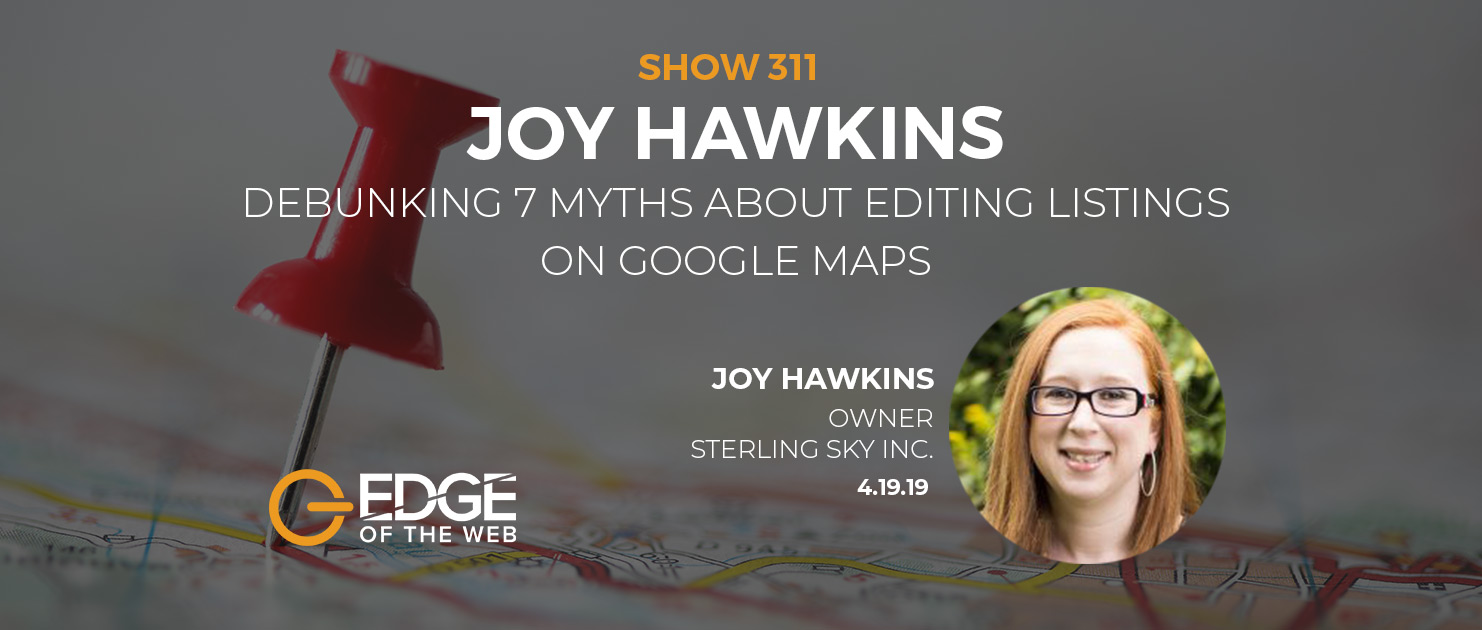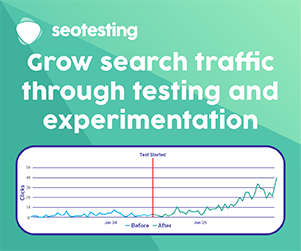Frustrated by all the SPAM in Local SEO? You’re not alone. When special guest Joy Hawkins, owner of Sterling Sky, spoke with Site Strategics CEO Erin Sparks and Digital Media Director Tom Brodbeck in episode 311 of the award-winning EDGE of the Web podcast, she explained why spam is continues to be such a problem with Google Maps. Here’s what we learned:
00:41:26
Why is SPAM so Prevalent in Local SEO
Why is spam such a huge problem in GMB and Google Maps? Short answer: Because it’s very lucrative! By way of example, law firms are notorious for this. One of the easiest, fastest ways for them to get lots of new leads is by creating 15 fake listings. Now all of a sudden they have offices ranking in all these different places and they’ll get a huge volume of phone calls, which are all valuable leads for their real office. So it’s high payoff and fairly low risk. The risk is that once you get caught, the listings get removed, but it feels like there are no long term penalties for the many businesses that are doing this. Their real business location remains unaffected. Then there are marketing companies who generate and sell leads to other businesses, and again one of the quickest ways to do it is creating fake listings to collect those leads.
Creating fake listings isn’t very hard. People do all kinds of awful things to create fake listings. Some will run ads on Facebook targeting low-income people and areas, offering them $50 or $100 to use their home address as the business address for a fake listing. It works even better if there’s no chance of a person ever visiting the fake address, since there’s no business there. This is why it’s most prevalent among businesses where the service provider come to your home, like plumbers, locksmiths, electricians and other home services. And why you don’t see it, for example, with hotels since the service or product is only offered at a real business location.
The frustrating thing is that every time Google figures out how to shut down one avenue or method of spamming, the spammers always seem to be several steps ahead and come up with a new way of doing it. People used to use P.O. Boxes to create fake listings, but Google caught on to that and won’t go live with a listing if the primary address is only a P.O. box. Then people started using virtual offices to create fake listings. But Google caught on to that as well, or co-working spaces. The problem is that there are legitimate businesses using virtual offices and co-working office space for real business, and it’s really hard to convince Google they’re legitimate! It’s better to avoid that if you want Google to be part of your digital marketing efforts.
00:49:51
Basic Local SEO Tips
There are a lot of different, simple things a lot of businesses miss out on when it comes to local SEO through Google Maps and GMB. Here are several tips to keep in mind:
- Primary Category: A lot of businesses overlook this one. Choose your primary category carefully! You want it to be as specific to your business as possible. Don’t use a generic label for your primary category. For example, use criminal lawyer instead of just lawyer. Using a more specific category will rank better than a more generic category. This gets tricky for companies that do a lot of different things, but just remember that there is a lot more ranking weight put into the primary category. Get creative! For example, if you’re an HVAC company in a place with real seasons, when winter rolls around change your primary category to “heating” and when summer comes, change it to “cooling” or “air conditioning.” But be careful, changing this primary category once or twice a year won’t raise any suspicions, but if you’re changing it frequently, it could trigger a suspension from Google.
- Business Name: If there are variations to your business name that are legitimate, it would be good to use one that has keywords in it, as long as it’s a legitimate name for your business. It does matter in terms of ranking weight, as does the page/site you link to from inside your profile. If you’re not a multi-location business, link to your main website’s home page.
- Reviews: Reviews are important, but not for ranking purposes. Having lots of reviews doesn’t result in better search ranking, at least not in any direct way that can be isolated and measured. Lots of great reviews are important because they do influence people to choose your business over others. It is totally okay to encourage customers to give you reviews, as long as you obey Google’s review guidelines. If you are reported in violation of those, the reviews will be removed. You cannot incentivize people giving you reviews, either with money or gifts. Having a review schema on your website is important as well. Google likes it when you have independent reviews on your website. You can use a tool for it like Gather Up.
00:59:28
Local SEO: It is the Best and Worst of Times!
Joy’s biggest pet peeve in local SEO is Google’s inability to get a handle on fake reviews. The fake reviews are actually more of a problem than fake listings because the fake reviews are getting harder and harder to identify. Yelp has figured out how to deal with and remove fake reviews, so why can’t Google? Besides that, though, local SEO is a truly exciting field to be in because of how much it’s constantly changing. Google is constantly rolling out a steady stream of great new features. If you want to see how this pans out over time, check out Joy’s Timeline of Local SEO Changes in 2019.
Connect with Joy Hawkins and Sterling Sky
Twitter: @JoyanneHawkins (https://twitter.com/joyannehawkins)
LinkedIn: https://www.linkedin.com/in/joyhawkins/
Sterling Sky Twitter: @SterlingSkyInc (https://twitter.com/SterlingSkyInc)
Sterling Sky Facebook: @SterlingSkyInc (https://www.facebook.com/sterlingskyinc)
Sterling Sky Web: https://www.sterlingsky.ca
The Expert’s Guide to Local SEO
Site Strategics and Your Digital Marketing ROI
If you’d like to find out the truth about whether or not your digital marketing efforts are paying off, Site Strategics can help! Find out how you’re really doing with EDGE sponsor Site Strategics and a Digital Marketing ROI Report that examines your existing SEO, content, social media, and PPC. Visit https://edgeofthewebradio.com/roi/ to get 30% off a comprehensive review of your digital assets!






















